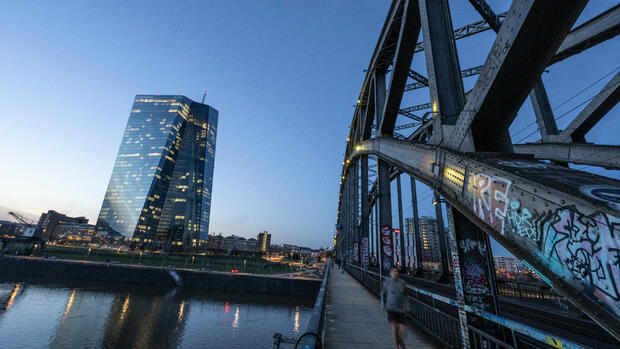The central bank is likely to raise interest rates further in May. The only question is: to what extent?
(Photo: dpa)
Frankfurt Market players are once again expecting stronger interest rate hikes in the euro area. After the recent turbulence in the banking sector, they had initially reduced their expectations significantly.
At the end of March, no further increases for this year were temporarily priced in on the futures market. However, investors are now assuming that monetary policy will be tightened again.
The minutes of the March ECB Council meeting published on Thursday provide indications of this. It states: “Unless the situation deteriorates significantly, financial market tensions were considered not to fundamentally change the assessment of the inflation outlook.”
After the bankruptcy of the Silicon Valley Bank and the problems at the major Swiss bank Credit Suisse, some economists had warned against excessive interest rate hikes. This was clearly reflected in lower interest rate expectations.
In the meantime, however, these have increased significantly again. Market prices currently point to a peak of around 3.75 percent for the interest rate on deposits in the euro area, which is decisive on the financial markets. Investors are therefore assuming further increases. The deposit rate is currently 3.0 percent.
Doubts about inflation forecasts
According to the minutes of the meeting, some ECB Governing Council members consider the central bank’s March inflation forecasts to be overly optimistic. You have expressed doubts that inflation in the euro area will fall as quickly as it assumes.
ECB forecasts indicate that inflation should gradually fall towards the target of 2% by 2025, while wages are expected to rise moderately and economic growth pick up.
A number of ECB Governing Council members described risks to the inflation outlook as “on the upside over the entire horizon”.
The economist at the major Dutch bank ING, Carsten Brzeski, sees the minutes as a sign of “a growing rift within the Governing Council”. In his view, it is still possible that the central bank will hike interest rates by half a percentage point at its next meeting on May 4th. However, he considers a small rate hike of a quarter of a percentage point to be more likely. Given the division within the panel, this is the most likely compromise.
A close decision is expected
The European economist at the US bank Goldman Sachs, Jari Stehn, also assumes an increase of a quarter of a percentage point. He also expects a tight decision. He believes a hike of half a percentage point is possible if April inflation numbers come in higher than expected and credit conditions don’t deteriorate any further.
>> Also read: Producer prices in Germany are again increasing more slowly
Goldman Sachs raised its interest rate forecast for the euro area this week. The bank now expects, as it did before the Silicon Valley bankruptcy, that the interest rate on deposits in the euro area will rise to a high of 3.75 percent this year.
In the past few weeks, supporters of a tight monetary policy in particular have spoken out from the ECB Governing Council. The head of the Austrian central bank, Robert Holzmann, spoke out in favor of a rate hike of half a percentage point in May. He justified his assessment primarily with the stubborn core inflation.
What is meant is the price increase adjusted for energy and food, which rose to a new record of 5.7 percent in the euro area in March. Central bankers pay close attention to core inflation because it is considered a good indicator of medium-term price developments.
Schnabel sees changed inflation drivers
Other advocates of a tight monetary policy, such as Bundesbank President Joachim Nagel, did not want to commit to the extent of the next rate hike. However, Nagel emphasized that “there is still a lot to do”.
Lithuania’s central bank governor Gediminas Simkus said the ECB was “not ready yet”. Dutch central bank chief Klaas Knot argued that monetary policy is not yet slowing down the economy sufficiently.
In a speech in Mannheim on Wednesday, ECB Executive Board member Isabel Schnabel emphasized that the structure of inflation had changed significantly. Initially, this was mainly caused by supply bottlenecks. In the meantime, however, Schnabel sees the high demand as the cause. Many economists argue that monetary policy primarily affects demand. On the other hand, most experts believe that the central banks have less room for maneuver in the event of supply bottlenecks.
Schnabel also declined to commit to the scope of the May rate hike. In view of the complex environment, she is not sure what the decision will be.
More: Core inflation rises to record high – Higher corporate profits drive the price surge.


